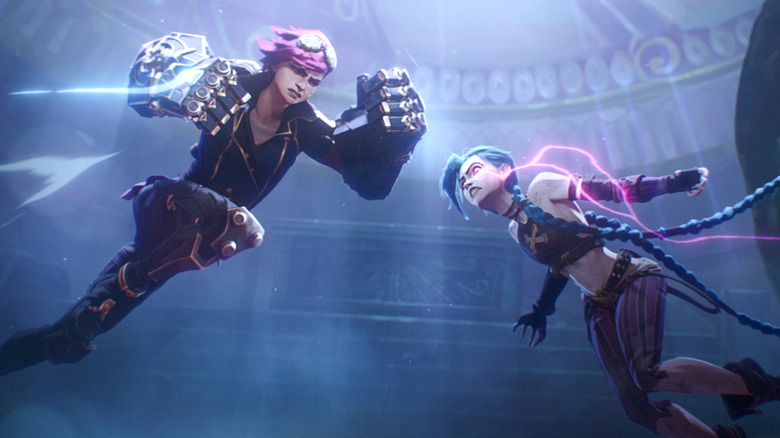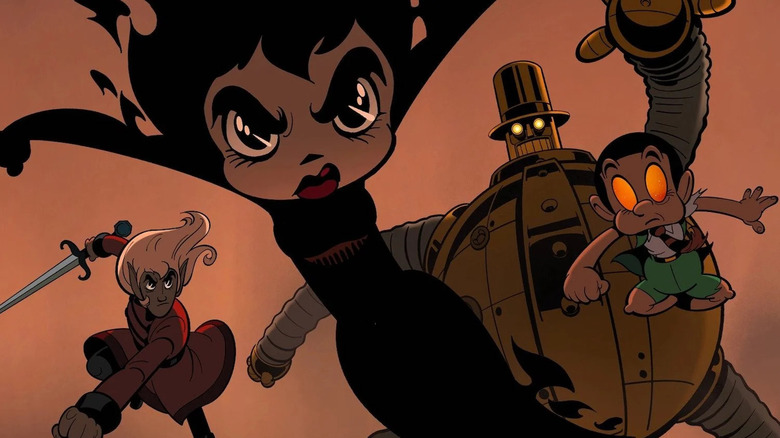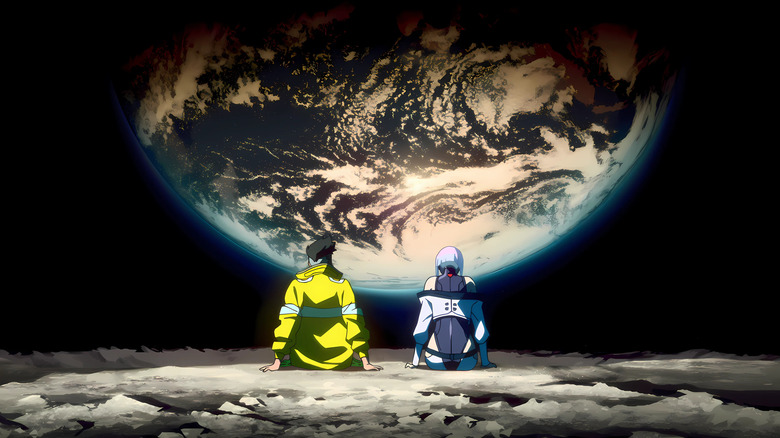The 5 Best Shows To Watch If You Like Netflix's Arcane
After a groundbreaking first season that seemed to herald the coming of a new era for TV animation, "Arcane" came to an end in 2024. It seems it really was a dream to have animated shows with the quality and production values of feature films without also requiring budgets so big that no studio — even a giant gaming studio — would want more than two seasons at a time.
Still, we'll always have "Arcane" and the truly astonishing work studio Fortiche did in translating the uber-popular "League of Legends" video game into an epic animated show with impeccable visuals, vast worldbuilding, and memorable characters. Season 2 clearly suffered from the show's cancellation, the pacing faltering due to what was obviously a 5-season plan being condensed into just two seasons, forcing many plotlines to be dropped or severely shortened — like the lives of many a character. Still, even if the ending of season 2 was underwhelming, there's no denying "Arcane" was a stunning viewing experience through to its end.
While we wait to see if more shows based on the world of "League of Legends" actually get made or not, you might be looking for another show to fill in the void left by "Arcane." Here are the best shows to watch if you crave more of the mix of fantasy, sci-fi, action, comedy and social commentary, and shows with an incredible soundtrack.
Unicorn: Warriors Eternal
Genndy Tartakovsky is a master of animation and his most recent show, "Unicorn: Warriors Eternal," feels like a culmination of his career to date. It's a thrilling, genre-bending adventure with a unique and fresh visual style, a world with vast lore, and action as fluid and dynamic as "Samurai Jack." This is a show that could only be made by a maestro at the height of his creative powers. Telling the story of three immortal warriors who reincarnate across time to fight an evil entity, the series mixes magic with science in fantastic ways. Our heroes are the daughter of Merlin the wizard, an elven warrior with a magic sword, a cosmic monk with access to the astral plane, and a steam-powered robot named Copernicus.
"Unicorn: Warriors Eternal" teases the kind of vast lore and mythology of something like "Star Wars," while only scratching the surface. The first season presents a fleshed-out world full of endless stories and nuanced characters. Meanwhile, the action has the kind of kinetic energy and energetic camera movements only Tartakovsky could inspire, brought to life by real-life wizards at Studio La Cachette.
For fans of "Arcane," the mix of fantastical, magical warriors and also robots, accompanied by a unique Victorian steampunk aesthetic of "Warriors Eternal" makes this a great watch. But what makes this unlike any other show is the way Tartakovsky unleashes his eclectic mix of influences from anime to old-time cartoons (the main character is essentially a goth version of Betty Boop while the monk is very much a Chuck Jones character). But don't let the cute visuals and thrilling action fool you; there's also a huge heart at the center of the story, and more than a few moments of tear-jerking emotion.
Fullmetal Alchemist
Though both "Fullmetal Alchemist" shows are worth watching, we're discussing the 2003 original adaptation here, which more closely matches the experience of watching "Arcane." This show, based on the manga of the same name by Hiromu Arakawa, takes place in a world of science and magic where people can learn to become alchemists: using their knowledge of physics, chemistry and molecular science to affect the world around them. Still, much like the hextech in "Arcane" leads to unexpected and horrific consequences, alchemy can be a curse as well as a blessing. We learn that in the very beginning when brothers Al and Edward Elric tried to use alchemy to bring their mother back to life — which backfired and resulted in Ed losing an arm and a leg, and Al losing his body, having his soul trapped in a suit of armor.
Though the action is stunning and the idea of alchemy as power innovative, what makes "Fullmetal Alchemist" so compelling even after 20 years is its melancholic tone and poignant social commentary. This is a show with incredible villains that serve as reflections of our heroes' mistakes, set in a military state that uses alchemists as superpowered soldiers and is constantly suppressing revolts. The 2003 series unequivocally presented a story inspired by and reflective of the then-ongoing Iraq War, with many parallels between the two. The story is constantly questioning the actions and morals of the characters, particularly those in powers that Ed and Al initially worship as heroes, portraying virtuous characters as complicit in a system that wages war for seemingly no other reason than the color of another people's skin and their religion.
Where "Arcane" tried (with mixed results) to tell a story of class warfare and the systems that keep people down, "Fullmetal Alchemist" was a shonen show that avoided a happy ending, and instead told a story of complex characters in a morally gray world where the concepts of good and evil are constantly being re-evaluated, where ancient systems of military might and imperialism are unequivocally in the wrong.
The Legend of Korra
"The Legend of Korra" had extremely high expectations to meet when it premiered, but it didn't take long for the show to carve out an identity of its own and prove itself a worthy successor to "Avatar: The Last Airbender." Though still cut from the same cloth, it stands out as completely different. This is a rare show that allows its hero to fail, constantly, with Korra learning from her villains and realizing they have some good points, as she comes to doubt even her place in her world. Indeed, arguably the highlight of the series is its impeccable collection of complicated and complex villains who are intrinsically connected to Korra's arc, and have some great points about systemic wrongs in the world of "Avatar."
Indeed, much like "Arcane," this show often showcases the ways institutions in Republic City and the Earth Kingdom fail its citizens, exploring how charismatic villains rise in times of crisis (and also create crises of their own). The show also has some fascinating explorations of industrialization and modernization that interrogate the very idea of the Avatar in a world that's more connected, more advanced, yet also less spiritually balanced. We see this in the way bending went from being a culturally-rooted art form into being used for professional sport and industry. Much like the work of Studio Ghibli, "The Legend of Korra" deals with the balance between tradition and advancement, showing how urbanization comes at the expense of nature.
Cyberpunk: Edgerunners
"Cyberpunk: Edgerunners" is a modern-day "Ghost in the Shell": a sci-fi show that explores how cybernetic augmentations affect our sense of self, and our humanity. It's also a visually striking video game adaptation with a fleshed-out world, compelling characters, and social commentary that doesn't try to play both sides as having good points. The show is cyberpunk to its core, in the original sense of that word. The world of "Edgerunners" is one where our protagonist's mom dies because she can't afford healthcare — a world deeply divided by class and institutionalized oppression. A side story set within the world of "Cyberpunk 2077," the story follows a teen who becomes a criminal hacker in order to pay the bills. He gains more and more notoriety with every job, affording him more and more augmentations that threaten to take away his sense of self.
Like "Arcane," this anime has plenty of references to its source material, but is a completely standalone story set within the world of a game. What makes "Edgerunners" stand out is that, in addition to its social commentary, it features some absolutely stunning action set pieces. Studio Trigger finds creative ways of portraying the powers that come with augmentations, with David's super speed being shown as a sort of Bullet Time effect that — when paired with thrilling and dynamic gunplay — is on par with fights in "The Matrix" or the "John Wick" movies. The action here is hyper violent and gruesome, with a stylized flare that makes the action cool and exhilarating at first before quickly taking a dark turn toward the horrific and harrowing. This is the kind of series that shows how anime going mainstream opens up for the wildest, most imaginative collaborations between masters of their craft and big international franchises.
Pluto
"Astro Boy" by way of "Watchmen"? That is but the start of what makes "Pluto" a masterpiece of animation, one of the best shows of the past decade, and a show every "Arcane" fan should watch. Boldly reimagining one of the most important anime of all time, "Pluto" takes place in a world of larger-than-life heroes that everyone knows and are suddenly and mysteriously being killed — while also using that background to tell a story that explores nuanced topics like the nature of humanity, whether robots can be people, and offer a lot of commentary on war.
Rather than offer hyper stylized visuals, "Pluto" goes for a grounded and realism in its aesthetics, taking from cinema in the way the camera is placed, the way lighting hits the realistic character designs. The anime is concerned with the idea of what can drive someone to do evil, and whether it is inherent or learned. That question is everywhere in the show, from the main detective story to the many war flashbacks. Though anime constantly uses real-world imagery to tell fantastical stories, "Pluto" is extremely direct in its parallels with the Iraq War, with the Kingdom of Persia being invaded because of claims by the United States (of Thracia) that Persia was hiding weapons (robots) of mass destruction, and Persia being ruled by a character looking exactly like an anime Saddam Hussein. There's also the theme of robots and whether they have emotions and identity, whether they feel pain, regret, PTSD. It's a story that Isaac Asimov would be proud of, and one of the most emotionally devastating anime in recent years.





